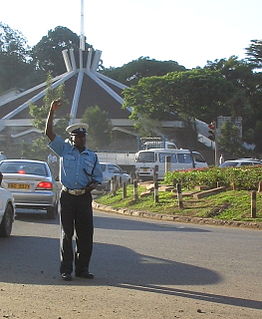Special Branch is a label customarily used to identify units responsible for matters of national security and intelligence in British, Commonwealth, Irish, and other police forces. A Special Branch unit acquires and develops intelligence, usually of a political or sensitive nature, and conducts investigations to protect the State from perceived threats of subversion, particularly terrorism and other extremist political activity.

The Swedish Security Service is a Swedish government agency organised under the Ministry of Justice. It operates as a security agency responsible for counter-espionage, counter-terrorism, as well as the protection of dignitaries and the constitution. The Swedish Security Service is also tasked with investigating crimes against national security and terrorist crimes. Its main mission, however, is to prevent crimes, and not to investigate them. Crime prevention is to a large extent based on information acquired via contacts with the regular police force, other authorities and organisations, foreign intelligence and security services, and with the use of various intelligence gathering activities, including interrogations, telephone tapping, covert listening devices, and hidden surveillance cameras.
An intelligence officer is a person employed by an organization to collect, compile or analyze information which is of use to that organization. The word of officer is a working title, not a rank, used in the same way a "police officer" can also be a sergeant, or in the military, in which non-commissioned personnel may serve as intelligence officers.

The Norwegian Police Security Service is the police security agency of Norway. The agency was previously known as POT, the name change was decided by the Parliament of Norway on 2 June 2001.

The National Police, formerly known as the Sûreté nationale, is one of two national police forces of France, the other being the National Gendarmerie. The National Police is the country's main civil law enforcement agency, with primary jurisdiction in cities and large towns. By contrast, the National Gendarmerie has primary jurisdiction in smaller towns, as well as in rural and border areas. The National Police comes under the jurisdiction of the Ministry of the Interior and has about 145,200 employees. Young French citizens can fulfill their mandatory service in the police force.

The Counterterrorism Division (CTD) is a division of the National Security Branch of the Federal Bureau of Investigation. CTD investigates terrorist threats inside the United States, provides information on terrorists outside the country, and tracks known terrorists worldwide. In the wake of the September 11, 2001 attacks, CTD's funding and manpower have significantly increased.
A security agency is a governmental organization that conducts intelligence activities for the internal security of a nation. They are the domestic cousins of foreign intelligence agencies, and typically conduct counterintelligence to thwart other countries' foreign intelligence efforts. For example, the United States Federal Bureau of Investigation (FBI) is the internal intelligence, security and law enforcement agency, while the Central Intelligence Agency (CIA) is an external intelligence service, which deals primarily with intelligence collection overseas. A similar relationship exists in Britain between MI5 and MI6.

The Canadian Forces Military Police provide police, security and operational support services to the Canadian Armed Forces (CF) and the Department of National Defence (DND) worldwide.

The Israeli Military Intelligence, often abbreviated to Aman, is the central, overarching military intelligence body of the Israel Defense Forces. Aman was created in 1950, when the Intelligence Department was spun off from the IDF's General Staff. Aman is an independent service, and not part of the ground forces, Navy or the Air Force.

The Ministry of Public Security is a public agency directly under the Government of Vietnam, performing the function of state management of security, order and social safety; counterintelligence; crime prevention investigation; fire prevention and rescue; execution of criminal judgments, judgment enforcement not subject to imprisonment, custody or temporary detention; legal protection and support; State management of public services in sectors and fields under the Ministry's state management.
The Australian Intelligence Community (AIC) and the National Intelligence Community (NIC) or National Security Community of the Australian Government are the collectives of statutory intelligence agencies, policy departments, and other government agencies concerned with protecting and advancing the national security and national interests of the Commonwealth of Australia. The intelligence and security agencies of the Australian Government have evolved since the Second World War and the Cold War and saw transformation and expansion during the Global War on Terrorism with military deployments in Afghanistan, Iraq and against ISIS in Syria. Key international and national security issues for the Australian Intelligence Community include terrorism and violent extremism, cybersecurity, transnational crime, the rise of China, and Pacific regional security.

The under secretary of defense for intelligence and security or USD(I&S) is a high-ranking civilian position in the Office of the Secretary of Defense (OSD) within the U.S. Department of Defense (DoD) that acts as the principal civilian advisor and deputy to the secretary of defense (SecDef) and deputy secretary of defense (DepSecDef) on matters relating to military intelligence and security. The under secretary is appointed as a civilian by the president and confirmed by the Senate to serve at the pleasure of the president.

Kenya's National Police Service (NPS) is the umbrella law enforcement organ in Kenya. The service was established in 2011 under Article 243 of the Constitution of Kenya, following dissolution of Kenya Police Force and Administration Police Force.
The counter-terrorism page primarily deals with special police or military organizations that carry out arrest or direct combat with terrorists. This page deals with the other aspects of counter-terrorism:

The Belgian Federal Police, is the national police force of the Kingdom of Belgium. It carries out specialized and supra-local administrative and judicial police operations, and supports local police services when needed. Additionally, the Federal Police is responsible for patrolling and ensuring the safety of the country’s highways. The Federal Police has approximately 12,300 officers and civilian personnel.
The National Counter Terrorism Policing Network (NCTPN) is the national collaboration of police forces in the United Kingdom working to prevent, deter and investigate terrorism in the United Kingdom. The Network is governed by the National Police Collaboration Agreement Relating to Counter Terrorism Activities Made Under Section 22A of the Police Act 1996. The Network is accountable to the United Kingdom Government and the National Police Chiefs' Council Counter Terrorism Coordination Committee which is chaired by the Metropolitan Police Service Assistant Commissioner of Specialist Operations (ACSO) who also acts as the National Lead for Counter Terrorism Policing. The Network is also functionally coordinated by two Senior National Coordinators who are usually Metropolitan Police Service Deputy Assistant Commissioners co-located within the Counter Terrorism Command.









